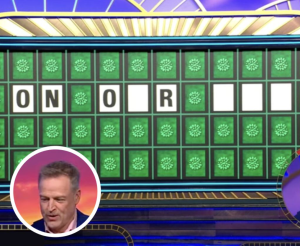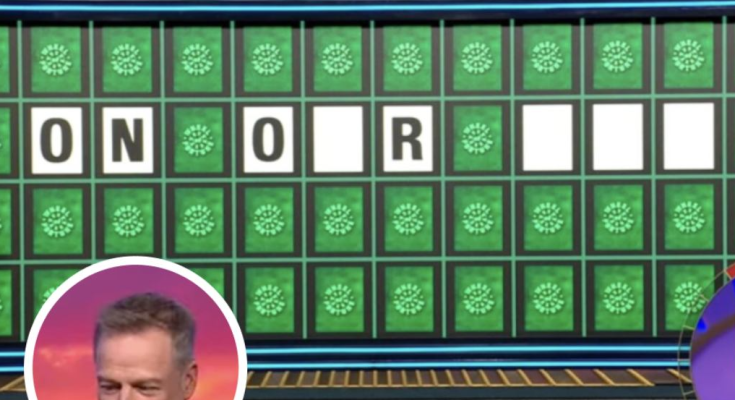The Green Flash
It was supposed to be a typical Friday night. The kind of evening where the television hums in the background, dinner plates clink in the sink, and the familiar cadence of Vanna White’s smile and Ryan Seacrest’s voice fills the room like a lullaby of routine. But on March 28th, Wheel of Fortune did something unexpected—it broke the rhythm. And in doing so, it cracked open a moment of collective bewilderment that would echo far beyond the studio lights.
Three contestants stood beneath the glowing puzzle board: Stephen Sporer from Minnesota, Christina White from California, and Megan Russell from West Virginia. The game had been tight, with bankruptcies and toss-ups keeping the scores close. But then came the second puzzle, under the category “Event.” The answer? Seeing the green flash.
The studio fell into a strange hush. Christina White solved it, but instead of applause, there was confusion. The audience blinked. The internet blinked. Reddit lit up with posts like, “What did that even mean???” and “No idea.” It wasn’t just a difficult puzzle—it was a cultural riddle. A phrase that sounded poetic, mystical, and utterly unfamiliar.
What is the green flash?
Ryan Seacrest, ever the host, stepped in with an explanation. It’s a rare optical phenomenon that occurs just as the sun dips below the horizon. For a brief moment—sometimes only a second—a green light flashes across the sky. It’s real. It’s beautiful. And most people have never seen it.
“I’m sitting there in a lawn chair with a wine cooler,” Seacrest joked, “watching its final moments. You see this green refraction of light—it’s quite beautiful.” Vanna White nodded, adding a gentle affirmation. The moment was clarified, but the confusion lingered. Because this wasn’t just about a puzzle—it was about the gap between experience and expectation.
For many viewers, the phrase seeing the green flash felt alien. It wasn’t part of their lexicon. It wasn’t something they’d ever heard, let alone seen. And in that gap, something fascinating happened: the show became a mirror. It reflected not just what people knew, but what they didn’t. It exposed the limits of shared cultural knowledge and the fragility of assumed familiarity.
Stephen Sporer, who would go on to win the game and enter the Bonus Round with $35,000, didn’t solve that puzzle. But he solved others—In the home stretch, Take a shower under a waterfall—phrases that felt more grounded, more tactile. And yet, it was seeing the green flash that haunted the episode. It became the ghost in the machine.
Why did it matter so much?
Because Wheel of Fortune isn’t just a game. It’s a ritual. It’s a nightly ceremony of predictability, comfort, and shared language. When that language breaks—when a puzzle feels like a poem instead of a phrase—it disrupts the ceremony. It forces viewers to confront the edges of their understanding. And in doing so, it invites something deeper: curiosity.
The green flash is real. It’s been documented by scientists and sailors, poets and photographers. It’s a moment of atmospheric magic, where the sun’s light refracts in just the right way to produce a fleeting emerald glow. But it’s also metaphor. It’s the kind of thing you only see if you’re looking. If you’re patient. If you believe.
And maybe that’s why the puzzle felt so jarring. Because it asked viewers to believe in something they hadn’t seen. It asked them to accept mystery as fact. And in a world that often prizes certainty, that’s a radical ask.
But there’s another layer.
The confusion around the puzzle also revealed something tender: the vulnerability of not knowing. Fans took to social media not just to mock the puzzle, but to admit their ignorance. “I’ve never heard of that before,” one wrote. “Or seen it in the many, many sunsets I’ve watched.” There was humility in the response. A willingness to learn. A softening.
And isn’t that what good storytelling does? It opens a door. It invites us in. It says, “You didn’t know this—but now you do.” And in that exchange, something beautiful happens. We grow.
Stephen Sporer didn’t win the Bonus Round. He chose the category “Phrase” and stumbled on a puzzle that many thought was a no-brainer. But by then, the episode had already done its work. It had already planted a seed. The green flash had entered the cultural bloodstream.
In the days that followed, searches for “green flash sunset” spiked. Articles were written. Photos were shared. People began to look at the horizon differently. And maybe, just maybe, someone saw it. That brief, shimmering moment when the sun says goodbye with a wink of green.
So what does it mean?
It means that confusion isn’t failure. It’s invitation. It means that not knowing is the beginning of knowing. And it means that even a game show, in its most routine form, can become a vessel for wonder.
Wheel of Fortune didn’t just baffle its fans—it reminded them that the world is bigger than their vocabulary. That there are phenomena waiting to be named. That sometimes, the answer isn’t obvious. And that’s okay.
Because life isn’t always toss-ups and prize puzzles. Sometimes it’s green flashes. Sometimes it’s mystery. And sometimes, it’s the quiet joy of learning something new.
So the next time you watch the sun set, look closely. Be still. Be curious. And if you’re lucky, you might just see it—that fleeting, beautiful, baffling flash of green.


